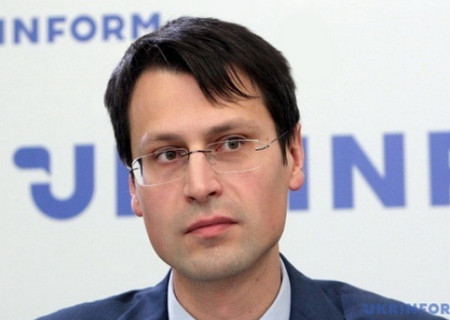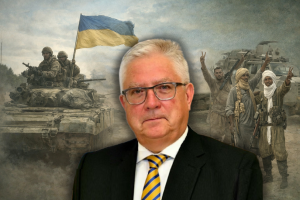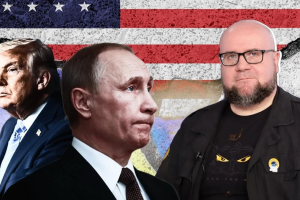
Виконавчий директор Фонду "Демократичні ініціативи" імені Ілька Кучеріва

For Friedrich Naumann Foundation For Freedom
In a statement after the extraordinary meeting in Brussels, NATO leaders warned Russia about “severe consequences” if it were to use chemical or biological weapons in the war against the Ukrainian people and army. This happened after an unnamed US national security advisor privately, and a French top diplomat openly told their Russian peers that any kind of chemical or bacteriological attack in Ukraine would constitute an intolerable escalation. Moreover, before the summit German Chancellor Olaf Scholz told the press that he had informed Russian President Putin directly that such attack would be unacceptable and unforgivable.
Western countries are concerned that Russian official statements about “Ukrainian secret labs” that allegedly develop chemical and biological weapons are in fact an attempt of a plausible cover-up for such attack on the Russian part. They are alarming because recently the Center of Countering Disinformation at the National Security and Defence Council of Ukraine (NSDC) published preliminary reports that Russian officers are given antidotes to military chemical agents, similar to the infamous “Novichok”.
Although NSDC officials clearly stated that this information is hard to prove and check, it is still a matter of great concern because the Russian ministry of defence announced that it could order the storming of Kyiv and the regional centres, such as Chernihiv, Sumy, Kharkiv, and regional centres in Donbas.
We must remember that after Russia intervened in the Syrian civil war the Syrian government forces used the nerve agent sarin and chlorine barrel bombs in attacks between 2015 and 2018. Until late 2021, Israel conducted occasional air strikes to destroy Syrian facilities allegedly involved in the production of such types of weapons. Moreover, the Kremlin was caught using a military chemical agent to kill opposition leaders in Russia.
So, we can argue that the Kremlin has got both capabilities, and got to get used to unconventional weapons if it sees their usefulness in military or political terms. Then, the key question is to define possible motives and objectives that the Kremlin would pursue in a possible dramatic turn in the war against Ukraine. This is important because it provides us with an understanding what measures must be implemented to mitigate or even prevent such a development.
First, we should bear in mind that WMD are also weapons of massive effect on public opinion. Russians might use this effect both domestically and in Ukraine. At home, the Kremlin could use an attack with chemical agents as “evidence” and illustration of “Nazism” in Ukraine, fueling the process of dehumanization of Ukrainians in the eyes of Russians and legitimation of the “total” protracted war in Ukraine. At the same time, such an attack could be used to provoke chaos, further increasing the rate of emigration of civilians from Ukraine, thus putting under stress neighboring countries and functioning of the Ukrainian damaged economy.
Second, the Kremlin might be tempted to test the promised “severe response” from NATO and the EU. It is true that sanctions hit Russia hard but there are still some caveats regarding sanctions against key Russian export commodities: oil, gas, diesel, and energy coal. Chemical attacks would definitely require a strong response, but they would also mean higher cost for Europe. As a result, Russia might attack to provoke hot internal debates among EU and NATO member countries that could hamper their decision-making process and distract attention from the more urgent needs. Russia could also count on the fact that the open use of WMD could terrify Europeans so that they decide to put pressure on Ukraine to come to an agreement with Russia in order to avoid further escalation and even use of nuclear weapons.
Third, the Kremlin is still unhappy with the fact that it cannot involve NATO in a direct confrontation. It cannot complete the desired picture of the final battle for Russian security and existential threat from the West. In fact, on March 25, Russian foreign minister Lavrov said that “the West” has declared a “hybrid war” against Russia, repeating a message about “US-sponsored military biological laboratories in Ukraine”. Thus, the Kremlin can use chemical weapons to provoke a strong NATO reaction, which, consequently, will give Russia a “legitimate” reason to hit NATO territory with a missile attack, especially the Eastern NATO members that provide weapons to Ukraine.
Finally, from a military point of view use of chemical weapons cannot guarantee the same effect as use of air superiority and cruise missile attacks. Therefore, if the Kremlin decides to do it, the battlefield objectives will move to the end of the list of arguments in favor of such a decision.
Now, it is time to think about what can be done to prevent such development.
Russia ponders the option of chemical weapons as well as a continuation of massive air and missile strikes against Ukrainian biggest cities because it does not see adverse consequences of such an escalation. While sanctions can undermine the middle-term strength of Russia and its military, they cannot stop military operations in the near future. Escalation of military actions remains the key to the Kremlin’s strategy in Ukraine because it believes it can bring the most desired result - the destruction of Ukraine, or at least allow Russia to keep newly occupied territories.
Therefore, if Russia loses its key capabilities to escalate, primarily the domination in the sky, it will be forced to consider other options, including partial or complete withdrawal from Ukraine in order to avoid complete failure. According to the Ukrainian military command, this can be achieved if Ukraine is given sufficient means to regain control of the skies: middle- and long-range air defence systems and warplanes. These assets are present in NATO member countries as remnants of Soviet/Russian military legacy. If “old” NATO members find solutions on how to compensate transfer of these assets to Ukraine and guarantee security of the “new” NATO members, then the threat of escalation and spillover of war in Ukraine will be significantly reduced.
However, the more time it takes to make this decision, the bigger is the risk of further escalation of war.








